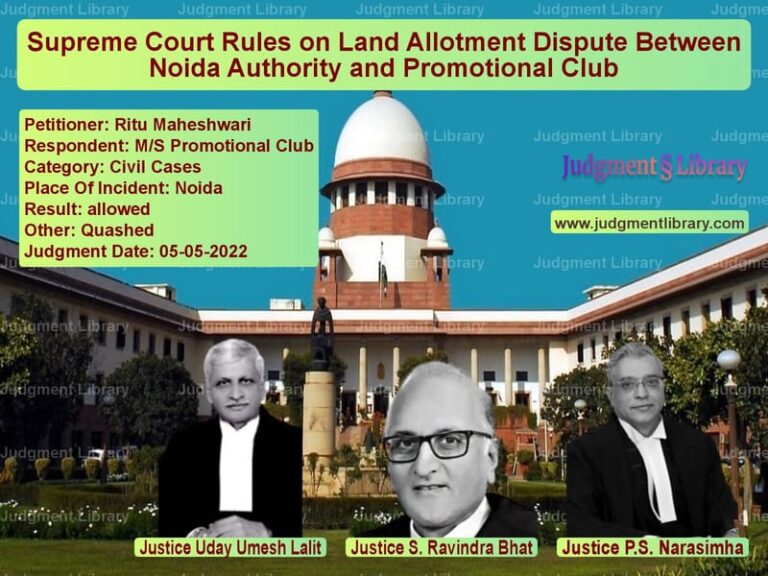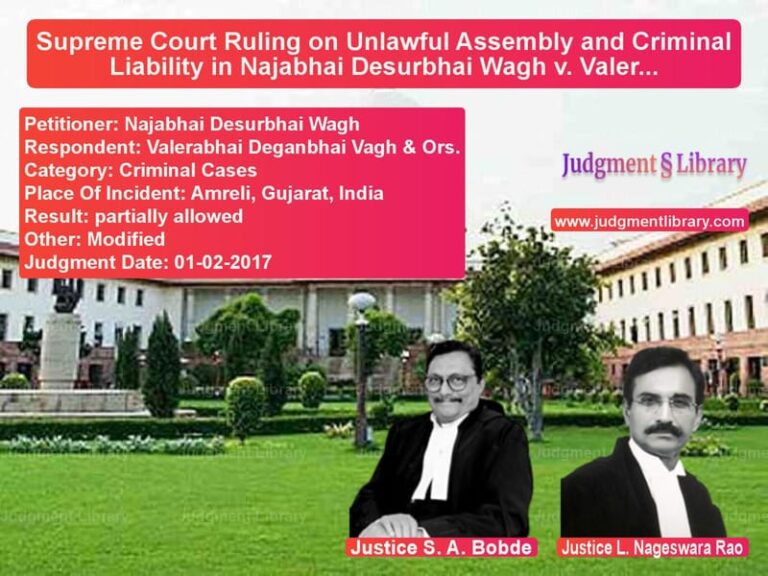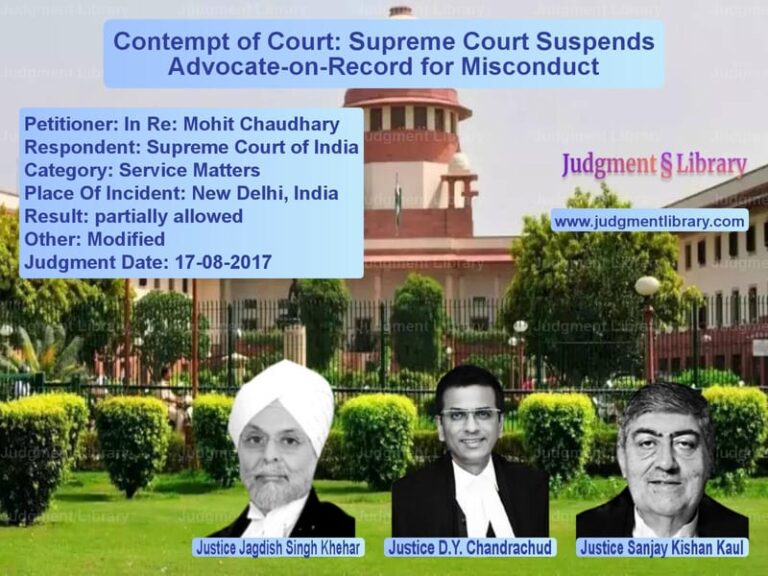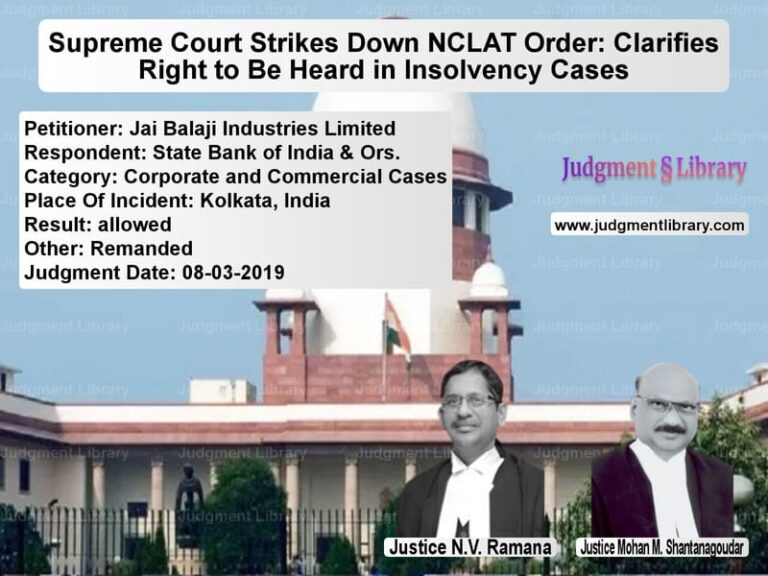Land Ownership Dispute: Supreme Court Overturns High Court’s Review in Harwansh Kaur v. Special Area Development Authority
The Supreme Court of India recently delivered a significant judgment in Harwansh Kaur & Anr. v. Special Area Development Authority (Counter Magnet), Gwalior & Ors., addressing a long-standing dispute over land ownership and government acquisition. The Court ruled in favor of the appellants, setting aside the Madhya Pradesh High Court’s decision that had allowed a review petition to reopen a previously settled case.
This judgment underscores the legal principles surrounding land ownership, procedural due process, and the limits of review jurisdiction. It also highlights the obligations of government authorities when dealing with private landowners and the procedural safeguards that courts must follow in adjudicating such matters.
Background of the Case
The case revolves around a parcel of land in Gwalior, Madhya Pradesh, originally owned by Dilip Singh, the predecessor of the appellants. The appellants, Harwansh Kaur and others, claimed legal ownership of the land, which they had inherited from Dilip Singh. However, the Special Area Development Authority (Counter Magnet), Gwalior, asserted that the land belonged to the government and had been earmarked for public development projects.
The appellants had previously approached civil courts, securing favorable rulings affirming their ownership. Despite this, the Special Area Development Authority continued to claim possession of the land, arguing that the title had never lawfully transferred to Dilip Singh.
The High Court initially ruled in favor of the appellants but later allowed a review petition filed by the government. This review reinstated the government’s claim over the land. Aggrieved by this decision, the appellants moved the Supreme Court to challenge the High Court’s reversal.
Legal Issues Examined
- Whether the appellants had lawful ownership of the disputed land.
- Whether the High Court correctly allowed the review petition despite a prior ruling favoring the appellants.
- Whether the government’s transfer of land was legally valid.
- Whether procedural lapses affected the validity of the High Court’s decision.
Petitioner’s (Harwansh Kaur & Anr.) Arguments
The appellants, represented by their legal counsel, presented the following arguments:
- The land had been legally transferred to Dilip Singh, and the appellants were his rightful heirs.
- The High Court had previously affirmed their ownership, and the review petition was an improper attempt to reopen a settled case.
- The government had no valid claim over the land, as there was no official record showing that the property had been lawfully acquired.
- The Special Area Development Authority had not followed due process in attempting to take possession of the land.
Respondent’s (Special Area Development Authority) Arguments
The respondents, represented by the government authorities, countered these claims by arguing:
- The land was always classified as government property, and any transfer to Dilip Singh was erroneous.
- The High Court’s review was justified because new documents had emerged proving that the government had continuously maintained possession over the land.
- The appellants had no legal right to claim ownership since the land had been earmarked for public development.
- The government had followed the appropriate legal procedures before asserting its claim.
Supreme Court’s Observations
On Land Ownership and Title
The Supreme Court carefully examined the historical records and prior judicial rulings in the case. It held that the land had been lawfully transferred to Dilip Singh, and the appellants’ ownership was valid:
“The competent officer had transferred the title to Dilip Singh, and there is no evidence to show that this decision was lawfully overturned.”
On the High Court’s Review Petition
The Supreme Court ruled that the High Court erred in allowing the review petition:
“A review petition cannot be used as a disguised appeal. The High Court engaged in re-examining merits, which is not permissible in review jurisdiction.”
The Court emphasized that review petitions are limited to correcting clerical errors or apparent mistakes but cannot be used to rehear settled matters.
On Government Land Transfers
The Court ruled that since the government had previously lost its claim in the civil courts, it had no authority to transfer the land:
“The government does not have the authority to transfer land that does not belong to it.”
On Procedural Irregularities
The Supreme Court found that the government had failed to follow the proper legal procedures before asserting its claim over the land:
“There is no evidence that the government issued the requisite notifications or followed due process before attempting to take over the land.”
Final Judgment
The Supreme Court ruled:
- The High Court’s order allowing the review petition was set aside.
- The appellants’ ownership over the disputed land was reaffirmed.
- The government’s transfer of land was declared null and void.
- The Special Area Development Authority was directed to relinquish possession of the land immediately.
Significance of the Judgment
- Reinforces the finality of judicial decisions: This ruling establishes that settled ownership claims cannot be disturbed through review petitions.
- Protects landowners from arbitrary government actions: Ensures that once ownership is established, the government cannot arbitrarily reallocate land.
- Clarifies procedural requirements for land transfers: Establishes that lawful ownership cannot be disregarded without due process.
- Limits the misuse of review petitions: Prevents parties from using reviews as a backdoor method to challenge settled decisions.
Conclusion
The Supreme Court’s ruling in Harwansh Kaur v. Special Area Development Authority affirms the principle that settled ownership claims cannot be disturbed through review petitions. The judgment upholds property rights, ensures that procedural justice is maintained in land disputes, and sets a clear precedent against arbitrary government action in land acquisitions.
This case serves as a reminder that the courts will protect the sanctity of ownership and ensure that legal transfers of land remain undisturbed by unwarranted government interventions.
Petitioner Name: Harwansh Kaur & Anr..Respondent Name: Special Area Development Authority (Counter Magnet), Gwalior & Ors..Judgment By: Justice Uday Umesh Lalit, Justice S. Ravindra Bhat.Place Of Incident: Gwalior, Madhya Pradesh.Judgment Date: 22-10-2021.
Don’t miss out on the full details! Download the complete judgment in PDF format below and gain valuable insights instantly!
Download Judgment: harwansh-kaur-&-anr.-vs-special-area-develop-supreme-court-of-india-judgment-dated-22-10-2021.pdf
Directly Download Judgment: Directly download this Judgment
See all petitions in Property Disputes
See all petitions in Landlord-Tenant Disputes
See all petitions in Specific Performance
See all petitions in Judgment by Uday Umesh Lalit
See all petitions in Judgment by S Ravindra Bhat
See all petitions in allowed
See all petitions in Quashed
See all petitions in supreme court of India judgments October 2021
See all petitions in 2021 judgments
See all posts in Civil Cases Category
See all allowed petitions in Civil Cases Category
See all Dismissed petitions in Civil Cases Category
See all partially allowed petitions in Civil Cases Category







